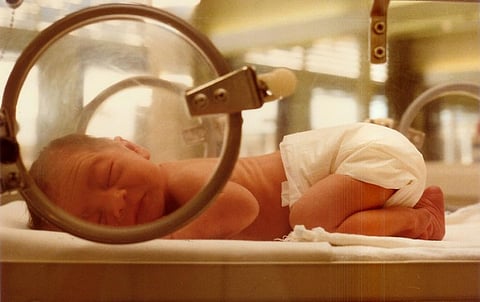

A low-cost, hand-held jaundice detector, invented by the students of Rice University, passed its first trial in reducing neonatal deaths in Africa. About 60 per cent of newborns worldwide are affected by jaundice. Delay in detection and treatment can cause permanent brain damage. It is the cause of death of 120,000 newborns globally.
BiliSpec is a low-cost and battery-powered reader designed to diagnose jaundice by quantifying serum Bilirubin levels from a small drop of whole blood.
Rebecca Richards-Kortum, a bioengineering professor at the Rice University and co-author of the study said that the clinical study of BiliSpec shows that saving lives of the newborns in sub-Saharan Africa is achievable. It simply requires the right tools in the right hands at the right time
Each BiliSpec test consists of a reader and disposable cards and costs about 5 cents. The test can be done in about two minutes right at the patient's bedside. This is especially useful in rural areas of Africa and South Asia where expensive laboratory equipment needed for this test is unavailable. Standard jaundice tests require multiple expensive disposables and laboratory equipment like centrifuges or spectrophotometers.
"Clinicians in sub-Saharan Africa typically diagnose jaundice by looking at a child and gauging the colour of their skin or the whites of their eyes," says study co-author Pelham Keahey, a graduate student of Applied Physics at Rice University who worked alongside clinicians at the Queen Elizabeth Central Hospital to gather data for the study. However, he stated in the paper that visual assessment is subjective and accuracy is poor as compared to laboratory measurement of total serum bilirubin (TSB).
A study on neonatology published by a Swedish journal, Karger, in 2016, showed that the South Asian countries suffer severe cases of neonatal jaundice. It is the highest in China where 49 per cent of total newborns develop neonatal jaundice. China is followed by Myanmar at 46 per cent. In India, severe cases of jaundice in neonatal admissions are at 15.3 per cent.
A studywhich was conducted to test the capability of BiliSpec, found that it is as efficient as a bilirubinometer. The study was conducted on 68 patients at the Queen Elizabeth Central Hospital in Blantyre, Malawi and the results were published in the Proceedings of the National Academy of Sciences, on December 4, 2017.
The device is part of a 17-piece neonatal package called NEST (Newborn Essential Solutions and Technologies). The finding comes at a time as NEST360°, an international team of scientists, doctors, and global health experts, took part in a competition worth $100 million conducted by the MacArthur Foundation on December 11, the winner of which will be announced on December 20. The money that the team receives would help them in achieving their goal to halve the neonatal deaths in Africa in the next 10 years.